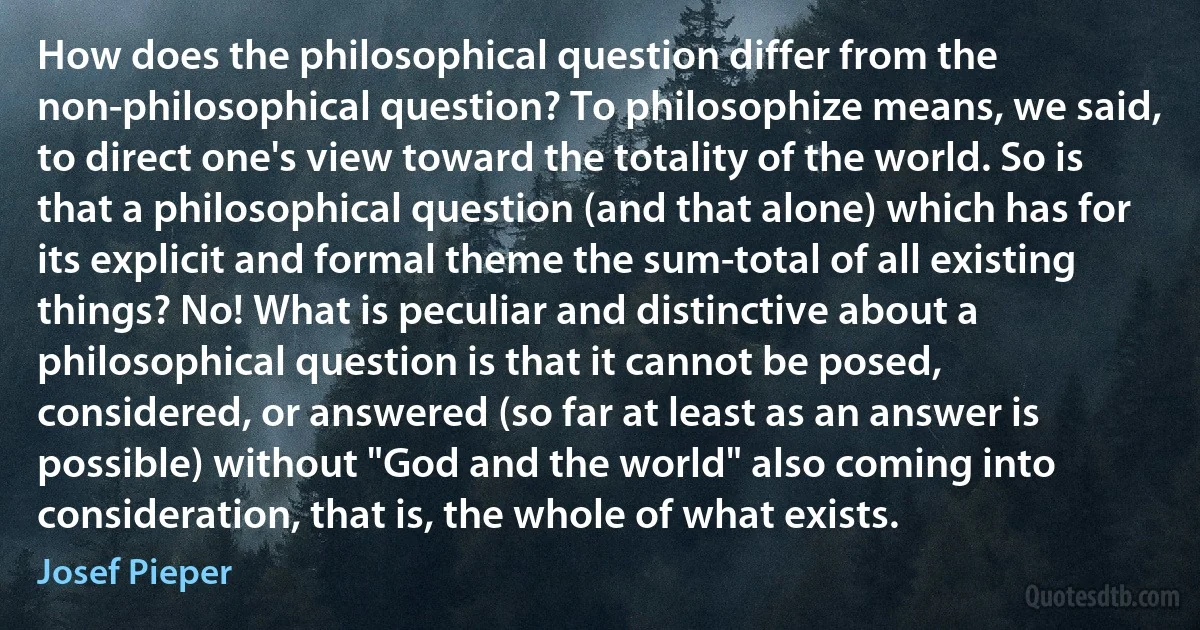
How does the philosophical question differ from the non-philosophical question? To philosophize means, we said, to direct one's view toward the totality of the world. So is that a philosophical question (and that alone) which has for its explicit and formal theme the sum-total of all existing things? No! What is peculiar and distinctive about a philosophical question is that it cannot be posed, considered, or answered (so far at least as an answer is possible) without "God and the world" also coming into consideration, that is, the whole of what exists.
Josef PieperRelated topics
answer coming distinctive explicit far formal least possible question say theme totality view world means things sum-totalRelated quotes
Each of the parts of philosophy is a philosophical whole, a circle rounded and complete in itself. In each of these parts, however, the philosophical Idea is found in a particular specificality or medium. The single circle, because it is a real totality, bursts through the limits imposed by its special medium, and gives rise to a wider circle. The whole of philosophy in this way resembles a circle of circles. The Idea appears in each single circle, but, at the same time, the whole Idea is constituted by the system of these peculiar phases, and each is a necessary member of the organisation.

Georg Wilhelm Friedrich Hegel
The whole life of Christians ought to be an exercise of piety, since they are called to sanctification. It is the office of the law to remind them of their duty and thereby to excite them to the pursuit of holiness and integrity. But when their consciences are solicitous how God may be propitiated, what answer they shall make, and on what they shall rest their confidence, if called to his tribunal, there must then be no consideration of the requisitions of the law, but Christ alone must be proposed for righteousness, who exceeds all the perfection of the law.

John Calvin
The new "ambiguity" means, in a way adjudged favorable to literary, poetic, intellectually and psychologically well-devised and praiseworthily executed linguistic performance, uncertainty of meaning, or difficulty for the interpreter in identifying just what the meaning in question is: it means the old meanings of ambiguity with a difference. It means uncertainty of meaning (of a word or combination of words) purposefully incorporated in a literary composition for the attainment of the utmost possible variety of meaning-play compressible within the verbal limits of the composition.

Laura Riding
Dialectical logic undoes the abstractions of formal logic and of transcendental philosophy, but it also denies the concreteness of immediate experience. To the extent to which this experience comes to rest with the things as they appear and happen to be, it is a limited and even false experience. It attains its truth if it has freed itself from the deceptive objectivity which conceals the factors behind the facts - that is, if it understands its world as a historical universe, in which the established facts are the work of the historical practice of man.

Herbert Marcuse
Here's to the crazy ones. The misfits. The rebels. The troublemakers. The round pegs in the square holes. The ones who see things differently. They're not fond of rules. And they have no respect for the status quo. You can quote them, disagree with them, glorify or vilify them. About the only thing you can't do is ignore them. Because they change things. They push the human race forward. And while some may see them as the crazy ones, we see genius. Because the people who are crazy enough to think they can change the world, are the ones who do.

Steve Jobs
